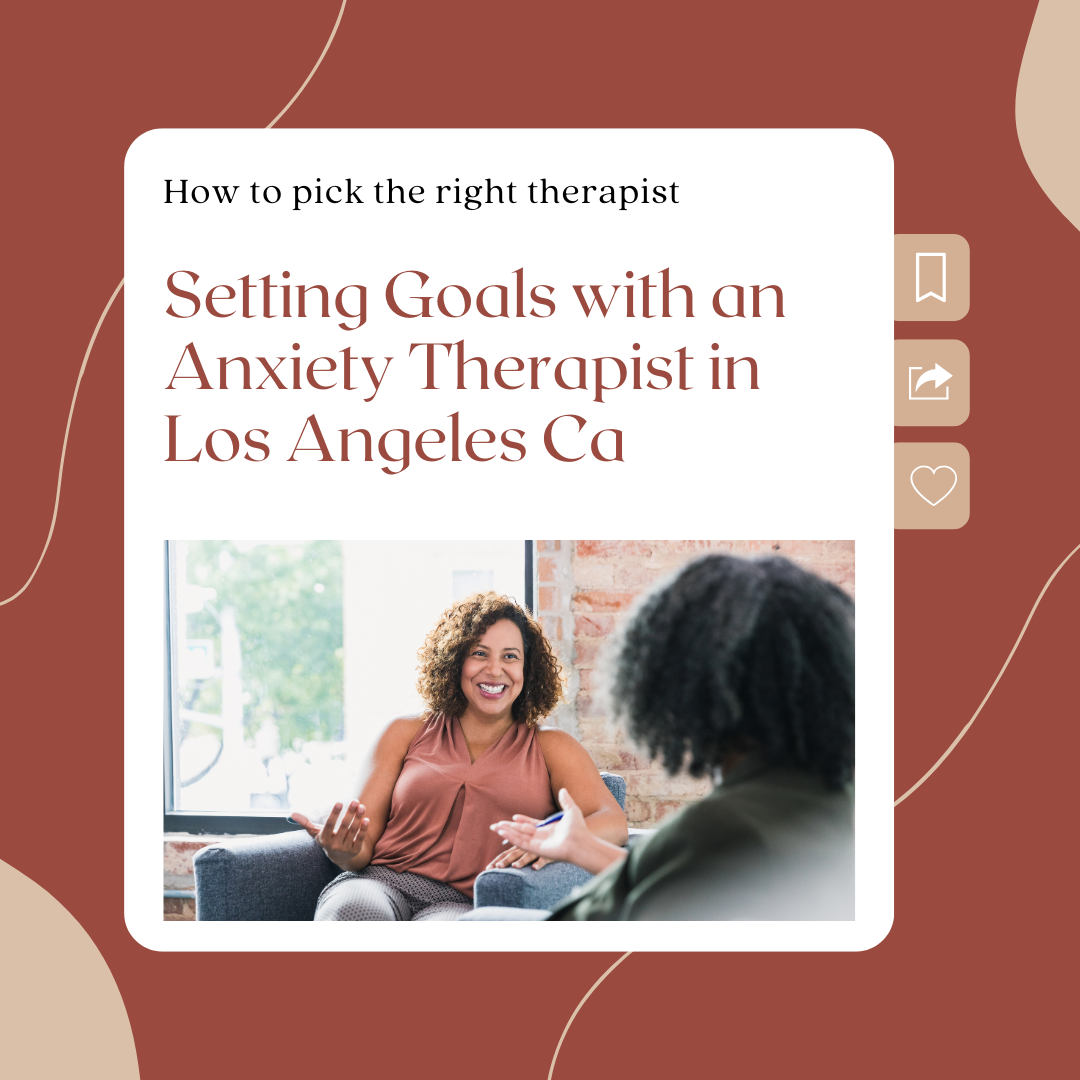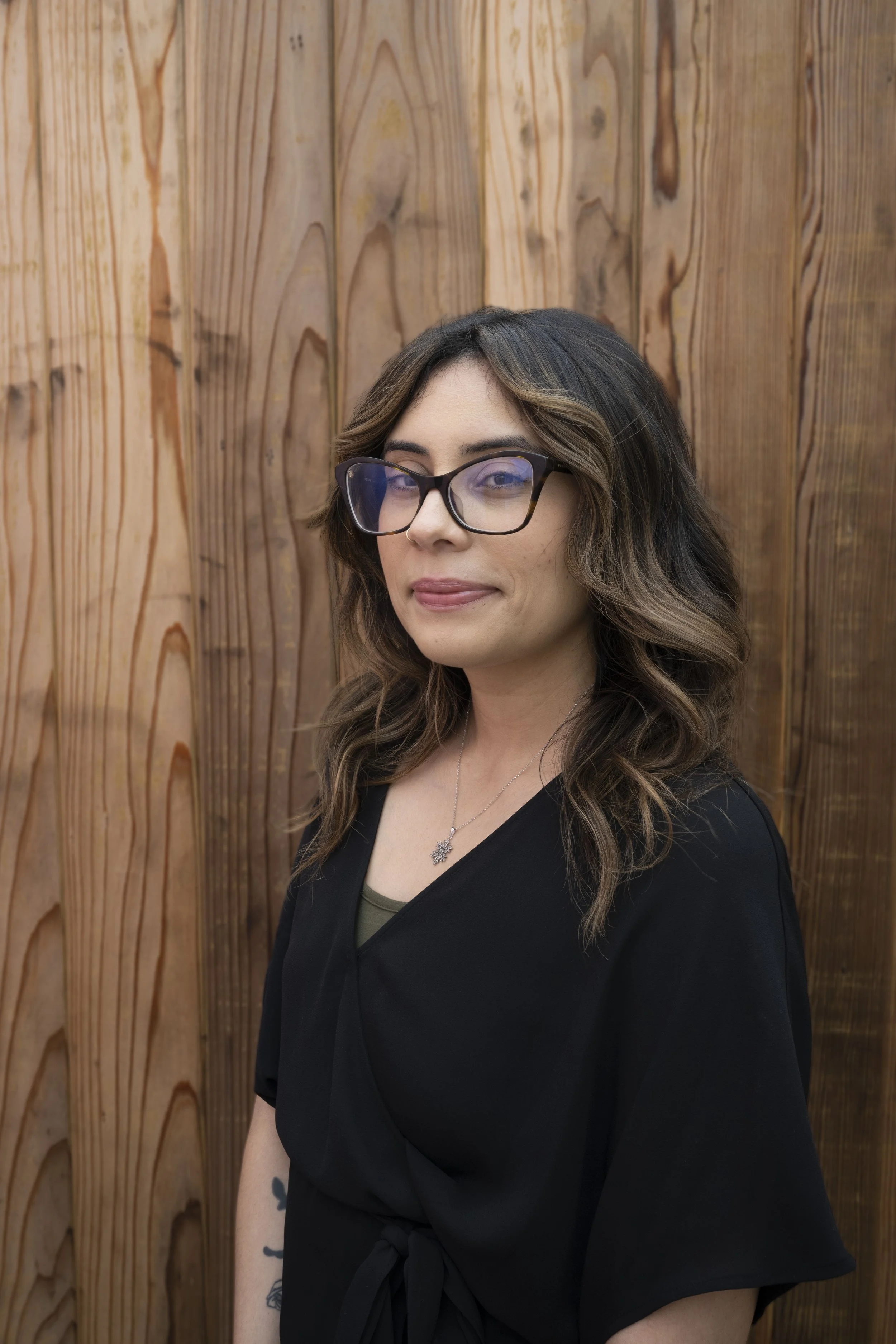Setting Goals with an Anxiety Therapist Los Angeles CA
How to Set Empowering Goals as a First-Gen, BIPOC, or Queer Client in Anxiety Therapy Los Angeles Ca
Starting therapy in Los Angeles and across California—especially for anxiety—can bring up a mix of curiosity, nerves, and hope. In my previous blog about “What to expect in your first anxiety therapy session,” I walk you through common questions in order to help create more ease into the process: from completing intake forms to settling into your first conversation with an Anxiety Therapist Los Angeles who works with first-gen, BIPOC, and queer clients
One key part of that early work with a therapist?
Creating a safe and collaborative space where you feel that your voice matters. That begins with naming what you hope to get out of therapy aka your therapy goals.
It can sound overwhelming and confusing if it is your first time seeking out therapy. You may want to work on a couple of things or you feel stuck on what to focus on. This blog hopes to bring you a bit more clarity and understanding on not only what therapy goals are, but also the process. Goal setting does not need to feel heavy or hold pressure. The process can be meaningful and flexible — and most importantly at your own pace.
What Does Goal Setting Look Like with an Anxiety Therapist Los Angeles Ca
First-gen, BIPOC, and queer folks often carry the pressure to "fix" or "prove" themselves. I like to remind clients as Therapist in Los Angeles who works with clients around unlearning cultural/societal/ familial expectations, that goal setting here is about liberation, and not perfection. The first session can feel anxiety provoking for some, it is helpful to keep in mind that sometimes therapy goals may take time to identify—and that is okay. If it is hard during the first session, there are subsequent sessions that may be needed to solidify a goal through helping you explore the struggle connected to receiving your needs.
The first sessions often focus on helping clients feel grounded enough to explore what’s bringing them in. That exploration is a valid starting point. I always remind clients that it’s okay to feel unsure, therapy can help bring clarity over time. This process also allows a therapist and a client to build trust and understand the root of a clients’ concerns. Of course, if there are safety concerns like harm to self or others, those take priority and are addressed right away in it’s own goal. So yes — you can have more than one goal.
What are Therapy Goals in Anxiety Therapy Los Angeles Ca?
Therapy goals are one of the first steps in building a collaborative relationship with a therapist. It allows for clients to have a voice in the structure and intention of their healing journey, and helps us as therapists to understand how to best support you as a client. They can come in different forms, the following are a few common themes that I have worked with clients around.
Therapy goals can be emotional where there is a focus on coping strategies or learning to create a relationship with them.
Identity goals related to therapeutic work around naming and affirming your gender, sexuality, or cultural identity without dimming yourself.
Boundary goals around setting limitations for yourself in different relationships (family, work, friends).
Improving daily functioning through learning how to manage anxious thoughts that has stopped you from dating, attending social events, and moving froward in your life.
Empowerment goals around feeling more in control of people pleasing behaviors (through identifying/ voicing their needs) or avoidance behaviors, whether in dating, relationships, or work.
Common Myths About Therapy Goals
Goals must be perfectly formed from the start
They don’t! Actually, it might take a couple sessions to get to identifying a goal with a therapist. There is so much to talk about in your first session, that is only 50 to 60 minutes, that it can be hard to get to talk about formulating a goal. It may not be fully formed for a couple more sessions.
In my first session with clients, we touch on generally what they are looking to work on which can be a couple of things — so we do not get to formulating a goal until maybe a couple of sessions afterwards. My priority when I first meet someone is making sure we are the best fit for each other and building safety/trust within the room.
Goals are static or unchangeable
They evolve! As I touch on below, goals change or are modified often thoughout your time in therapy. It is actually pretty difficult to stick to one goal in your work with a therapist, that is because changes and transitions and new stressors always arise in our individual lives. As well as the more a client feels comfortable with a therapist or grows in their awareness, new things can resurface. Meaning your goals also will adapt to ensure your therapy is reflective of this.
Therapy must be all progress, all the time
This is the most common misconception that I have come to find with my own clients, who come in with the idea that starting therapy means you are making progress all the time. As I work primarily with First Gen high achievers, I do remind them that progress is different for everybody and back steps happen. It is not reflective around their lack of participation and their growth. When we grow up around messages that we need to try our hardest and failure is not an option, it is hard to see that back steps like struggling with anxious feelings when a new stressor comes along to be reflection on failing in therapy.
For example, someone who struggles with people pleasing due to the fear of losing people in their life and has learned to regulate their nervous system, thus feeling less anxious within relationships.
That goals = fixing something that’s broken
Goals are more about unlearning cultural/societal/ familial expectations
Deepening a new layer of understanding into yourself
Growing in new ways of you want to define your boundaries, standards, expectations, and relationships with yourself and others
How Do You Create Goals with a Therapist Los Angeles for Anxiety?
As a therapist who works with adults who struggle to utilize their voice outside of a therapy room, I co-create goals with them through guided questions to help them get in the practice of embodying using their voice in a gentle manner.
I often encourage them to reflect around these questions to help them identify what changes they would like to see or what they hope to learn about themselves:
“What would growth look like for me in three months?”
“If I look back on my time in therapy, I would like to see these types of differences.”
“What was the turning point for me to want to look for a therapist?
“What do I want more of in my life?
“What do I want to struggle less in"?
How Do I Know if I am Making Progress in Therapy?
A good fit with a therapist often includes feeling like you're making meaningful progress. The benefits of defining a goal in therapy is having a baseline to explore progress.
What are the changes you can notice?
It can be internally (do you notice a decrease in restless sleeping or less overthinking?), externally (is it becoming easier to set boundaries or express your emotions?), or both (are you noticing it is becoming easier to feel more at peace with your worries in order to express your feelings to others, with less fear?)
In addition, there can be changes in frequency, intensity, and duration of how you are experiencing difficulties like overthinking and uncertainty in your daily life. These are self-reflective tools I discuss with clients throughout our work together.
As a therapist Los Angeles Ca for anxiety, I remind all my clients these different shifts are to watch out for. It can be hard to monitor progress from therapy especially if you are first gen and have been taught to always do more, grow more, achieve more. So, I am mindful that in my practice we are tracking progress in different ways:
Conversations built into your therapy sessions whether in the beginning or end of sessions.
Self Tracking on internal shifts, external shifts, or both.
Tools that come in a self-report measures (like the PHQ or GAD scales) or a survey that is sent throughout our work together. The survey is also a great tool I use in order for my clients to have the space to provide feedback onto their therapy journey as well. I have come to find that clients enjoy using this, and again — we are working towards embodying a practice of utilizing your voice outside of the therapy room.
Do Therapy Goals Change?
Therapy goals often evolve as clients grow or as new life challenges emerge. Goals change a lot more often than people might think.
For example, someone might start therapy to manage anxiety, but later shift focus to boundaries, relationships, or self-worth as those issues become more present. These also can built into your treatment just as the same as talking about your progress.
For myself, clients who I see on a weekly basis will have their progress reviewed every 3 months, and tweaks may be made to the treatment goals. At times, it can happen sooner or later. I have come to find that when I first begin working with a client, there is an initial focus on tools to manage the much more pressing issue like feelings of overwhelmed and dread, then the more in depth work around exploring the layers underneath those feelings really begins.
Therefore new goals evolve as we work together to get to a place where clients understand themselves more, identify what they want to keep, decide what they want to grow away from, and how to live more attuned to this different way of living — and less ridden by those old feelings of dread and overwhelmed.
How can Someone Begin Anxiety Therapy Los Angeles Ca to Help Support Their Mental Health Goals?
Starting the process of trying to find the right therapist for you can feel overwhelming, and the fact that you are starting the search is commendable. It can take a while to get to this place, and you are doing it! It’s important to find someone whose the right fit for you.
I recommend starting by identifying what kind of support you're looking for, and then seeking a therapist who understands your identities and values.
Allow this blog to help be that guide to explore within yourself what are goals you are thinking of. Then move towards reading therapist bios, scheduling consultations, and using online directories to explore options and assess fit.
Want more of an in depth guide on tips to help you find the right anxiety therapist for you? Click here.
You Deserve Therapy That Moves at Your Pace & Honors Who You Are
If you’re looking for an anxiety therapist in Los Angeles, CA who understands the unique experiences of first-gen, BIPOC, and queer clients, explore more about my approach on my homepage.
My role isn’t to hand you a checklist—it’s to walk beside you as you define healing on your terms. Whether you're brand new to therapy or coming back with a clearer sense of self, you deserve goals that feel doable and truly yours.
Ready to co-create goals that support your growth, self-trust, and peace? Contact me today for your free 15 minute consultation at (323) 493-6644 or Book A Session with me here.





